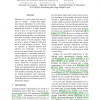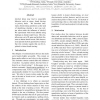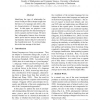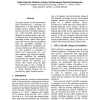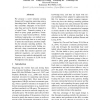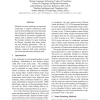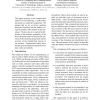ACL
2015
8 years 7 months ago
2015
Meaning of a word varies from one domain to another. Despite this important domain dependence in word semantics, existing word representation learning methods are bound to a singl...
ACL
2015
8 years 7 months ago
2015
Alcohol abuse may lead to unsociable behavior such as crime, drunk driving, or privacy leaks. We introduce automatic drunk-texting prediction as the task of identifying whether a ...
ACL
2015
8 years 7 months ago
2015
We introduce C-PHRASE, a distributional semantic model that learns word representations by optimizing context prediction for phrases at all levels in a syntactic tree, from single...
ACL
2015
8 years 7 months ago
2015
Identifying the type of relationship between words provides a deeper insight into the history of a language and allows a better characterization of language relatedness. In this p...
ACL
2015
8 years 7 months ago
2015
This paper reports on and demonstrates META-SHARE/QT21, a prototype implementation of a data sharing and annotation service platform, which was based on the META-SHARE infrastruct...
ACL
2015
8 years 7 months ago
2015
Stubs on Wikipedia often lack comprehensive information. The huge cost of editing Wikipedia and the presence of only a limited number of active contributors curb the consistent gr...
ACL
2015
8 years 7 months ago
2015
We propose a novel semantic parsing framework for question answering using a knowledge base. We define a query graph that resembles subgraphs of the knowledge base and can be dir...
ACL
2015
8 years 7 months ago
2015
Methods for name matching, an important component to support downstream tasks such as entity linking and entity clustering, have focused on alphabetic languages, primarily English...
ACL
2015
8 years 7 months ago
2015
We propose a neural network model for scalable generative transition-based dependency parsing. A probability distribution over both sentences and transition sequences is parameter...
ACL
2015
8 years 7 months ago
2015
This paper proposes a new unsupervised method for decomposing a multi-author document into authorial components. We assume that we do not know anything about the document and the ...
